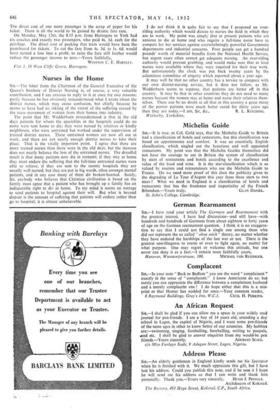Nurses in the Home
SIR,—The letter from the Chairman of the General Executive of the Queen's Institute of District Nursing is, of course, a very valuable contribution, and I am anxious to reply to it at once for two reasons: partly because he has obviously misunderstood what I wrote about the district nurses, which may cause confusion, but chiefly because he seems to have had no inkling of the extent of the suffering caused by the mass movement of women from their homes into industry.
The point that Mr. Wedderburn misunderstood is that in the old days patients for whom the specialists in the hospitals could do no more were sent home to die; they were nursed by relatives or kindly neighbours, who were untrained but worked under the supervision of trained district nurses. These untrained women are now all out at work, and there are not nearly enough district nurses to take their place. That is the vitally important point. I agree that there are more trained nurses than there were in the old days, but the increase does not nearly balance the loss of the untrained nurses. The dreadful result is that many patients now die in torment; if they stay at home they must endure the suffering that the full-time untrained nurses were able to relieve; if they are sent to the county hospitals they are usually well nursed, but they are put in big wards, often amongst mental patients, and in any case many of them die broken-hearted. Surely, Sir, anybody who believes that Christian civilisation is based on the family must agree that a patient who has brought up a family has an indisputable right to die at home. To my mind it seems an outrage to send patients to hospital against their will. But what is beyond dispute is the amount of suffering that patients will endure rather than go to hospital; it is almost unbelievable.
I do not think it is quite fair to say that I proposed an over- riding authority which would dictate to nurses the field in which they are to work. My point was simply that at present patients who are anxious to die at home and who require a full-time nurse have to compete for her services against overwhelmingly powerful Government departments and industrial concerns. Poor people can get a hundred pounds' worth of material benefits from the National Health Service, but urgent cases often cannot get adequate nursing. An over-riding authority would prevent grabbing, and would make sure that at least nurses were available where they were required for their true work. But unfortunately the clock was put back twenty years by the calamitous committee of enquiry which .reported about a year ago.
It may well be that no other country has a service to compare with our own district-nursing service, but it does not follow, as Mr. Wedderburn seems to suppose, that patients are better off in this country. It may be that in other countries they do not need so many nurses because the women stay at home and nurse their relatives them- selves. There can be no doubt at all that in this country a great many of the poorer patients were much better cared for thirty years ago
than they are today.—I am, Sir, &c., R. L. KITCHING. Wetherby, Yorkshire.


































 Previous page
Previous page